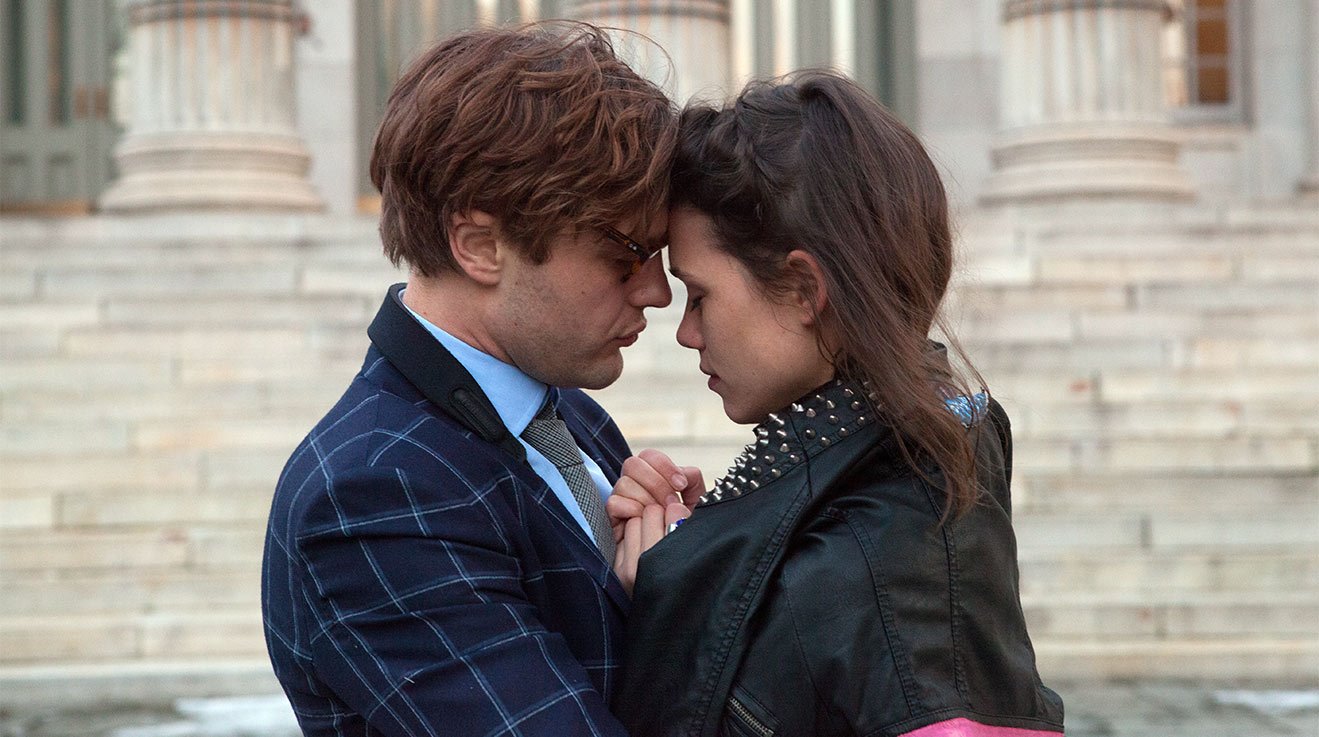For a little while, I Origins looks good enough and seems deep enough that you think it's actually a good movie. It's clearly a movie in the wake of Shane Carruth's Upstream Color. Director Mike Cahill's previous effort, Another Earth, shares little of I Origin's aesthetic, which can be described as "a friend of a cousin of Terence Malick."
Apparently Cahill thought Upstream Color's fundamental problem was its lack of explaining. Unfortunately, to rectify this, Cahill telegraphs every development in I Origins from about six miles away.
 Fox Searchlight
Fox SearchlightThe movie revolves around Ian (Michael Pitt), a grad student with an ocular obsession who's trying to disprove Intelligent Design "once and for all" by showing that eyes can evolve from eyeless animals. One night, at a Halloween party, he meets Sofi, woman wearing a face-mask that covers everything but her eyes (Astrid Berges-Frisbey). They separate at the party, though, and he's sure he'll never see her again.
But a few weeks later, a series of dazzling coincidences reunites the couple, who immediately begin a passionate love affair. (The fact that this "dazzling coincidence" happens amidst a staggering number of elevens (I I, eye-eye) shows the kind of slap-your-forehead obviousness this movie considers "clever.") They stay together until a tragic accident, at which point it's only Ian's lab partner Karen (Brit Marling) who can get Ian back on track to disproving intelligent design.
The drama's focal point is the discovery that children are being born who have exact iris matches with the recently deceased—a question that prompts Ian and co. to speculate about whether this is just a wacky random happenstance, or evidence of something more transcendent in nature. Ian—the avowed atheist ("who might even be, gasp, dogmatic and myopic," the movie relentlessly intones)—comes face-to-face with a spirituality he'd so readily dismissed in his lost love.
Unfortunately, the movie mostly goes about this in such a ham-fisted way that the whole enterprise becomes a bit, well, silly: "silly" being the word I thought of while I was watching the movie, which is strange. There's a lot of non-silly things happening in the movie: jealousy, death, blindness, sexual confusion, and spiritual awakenings consume the latter half of the movie.
But they're put together like a chess player explaining his moves in excruciating detail to someone who's never played the game before. I Origins is pretty convinced that you're dumb, and need to have your hand held through this whole process. (One example of the kind of mega on-the-nose symbolism the movie tends to indulge in: Sofi's tragic passing happens after Ian's eyes have been doused with chemicals, rendering him blind, though he's wearing his glasses over his bandages. See? See? Get it?)
 Jelena Vukotic / Fox Searchlight
Jelena Vukotic / Fox SearchlightAnd the film's devolution into latter-half silliness is a real bummer, because the first half contains some fantastic moments, courtesy of all actors involved. Michael Pitt is infinitely more relatable playing a genius loser scientist than he is a Respectable Family Man; similarly, Brit Marling's character is one of the few I've ever encountered who actually loses dimensionality as the film goes on, moving from the layered and insecure Lab Help to a just sort of universally affirming wife, just another cog in the film's plot machine.
When you exclude the moments that feel inappropriately filched from To The Wonder, I Origins' first half actually has more than a handful of really human, touching scenes. It's just a shame that they don't carry over, once the movie decides its about its message more than about its characters.
But even if the movie didn't have those problems, it would still struggle with a way more fundamental issue: I Origins sets up the conversation as Science vs. Faith. Ian is presented as a kind of logical positivist in the vein of Ayers or Russell. When asked why he doesn't believe in God, Ian says that you should have to disprove God, but that it should be the burden of believers to prove that he's there in the first place. "I believe in data points and facts," he says at one point (the dialog frequently being just about this tin-eared).
The movie lays out its thesis question late in the game, while Ian's speaking to an Indian woman who's helping him investigate his claim: "The Dali Lama said that if he encountered proof that his beliefs were incorrect," she says, "then he would change them. So what if you encounter proof that your beliefs are incorrect?"
The movie practically hinges here: is Ian going to adhere to his own quasi-Dawkinsian dogma, or will he be open-minded enough to accept the possibility of a spiritual reality?
To its credit, the movie doesn't frame science and faith as incompatible. But it does a fairly bad job of characterizing both science and faith. On the one hand, it's only the most rigid logical positivists (like Richard Dawkins or Bill Maher) who would argue that you need proof of something's existence for it to be a "real thing"—for instance, love, which plenty of non-believers would claim is something other than a bunch of chemicals in the brain.
And on the other hand, there's no sense of a coherent faith proffered in the movie. Sofi believes in a living statue, to some extent, and in reincarnation, and has a Zoroastrian logo hanging around her neck, but it's never clear what effect this belief has on her life, if any. It's just sort of there for Ian to disagree with or find childish, but it doesn't make her less afraid of death, and doesn't seem to make her stronger, or more independent. If anything, the faith presented in the movie is just an institutionalized irrationality—is not wanting to know anything about anything, because mysteries are sexy and exciting.
In a scene right before the movie's second half, Sofi and Ian discuss some worms he has in the lab, which have been mutated to have a gene that allows for eyes, even though the worms have no eyes at all. She discusses—at an excruciatingly slow pace, the filmmakers going slow so that you can keep up with them (sigh)—how worms that have never seen light couldn't possibly know it's there, couldn't ever understand what it's like to see, what dimensions are, and yet: light exists. So then what if humans were simply blind worms, one spiritual level removed?
This kind of thing is the sort of faux-profundity my generation can kind of go nuts for sometimes, it's also only functional if there's anything to believe in—something the movie never offers. And what good are eyes if there's not anything to see?
Caveat Spectator
About 50 profanities in total, split evenly between f-, s-, and d-words, as well as a handful of other more minor swearies. Ian and Sofie meet and almost immediately have sex—we see her upper thigh but no nudity. They sleep together other times over the course of the film, but only sides and lower backs are visible. Later we see them in bed and she's topless. A character is interrupted while pleasuring himself. One character loses her legs in an elevator accident; we don't see the event, and the aftermath is shot in such a vague and out-of focus way that it's way more haunting than if they'd actually just shown the thing.
Jackson Cuidon is a writer in New York City. You can follow him @jxscott.











